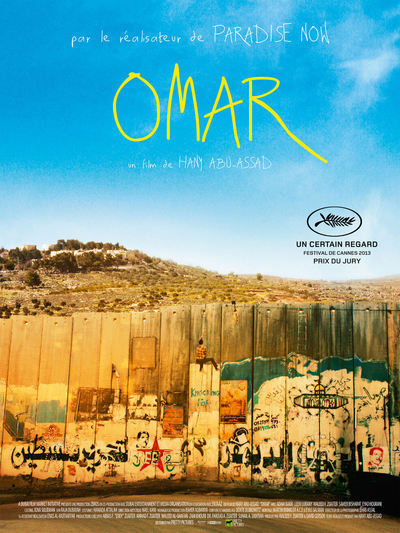« Coffee Break | Main | Pete Walker: A House and a Home »
June 10, 2014
Omar

Hany Abu-Assad - 2013
Adopt Films BD Region A
There's a scene I really liked in Omar. An Israeli agent is interviewing the imprisoned Palestinian Omar, trying to convince him to provide information in exchange for freedom. The agent is twice interrupted by phone, first by his wife, then by his mother. The agent has to remind both women that he can't do anything about their respective problems because he is in the West Bank. The guy is exasperated by both women who are seemingly oblivious to his work. Maybe the scene worked for me because it was a moment of humor in a generally humorless film.
Stories involving the conflicts between personal loyalties and political loyalties can be engrossing, much to the point where one is not sure which screen character should be awarded the most sympathy. Omar, in contrast, largely left me cold. And that might be because the political aspect of the film reduced the conflict to one of "us versus them", the Israeli oppressors and the Palestinian oppressed. In contrast, the relationship between the three friends who are self-described freedom fighters is of more interest because of the various shifts between the three men.

The trio set up the shooting of an Israeli soldier. During a raid, Omar is caught. The Israelis seem especially interested in capturing Tarek. Omar is freed on the condition that he provides information leading to the capture of Tarek. Omar is suspected of being a collaborator, or a double agent. Omar tries to protect the identity of Amjad, his rival for Tarek's sister, and the actual shooter. What is of interest is the continual shift between perception and reality. That shift involves all of the major characters, which in turn precipitates the film's tragic conclusion.
I also have to wonder where anyone got the idea of comparing Omar's relationship with Nadia to that of Romeo and Juliet. These are not the children of two families with some kind of ongoing dispute. The reason why their relationship is kept secret has more to do with specific cultural practices, as well as the more practical concerns when one lives in the West Bank and the other in a section of the Palestinian Territories. Even when everyone is in western style clothing, Omar still would need the traditional approval from Nadia's family, and especially Tarek, to marry Nadia.
What is also of interest to me is to see the difference between how a Palestinian filmmaker presents Palestinian life and the Palestinian-Israeli conflict in comparison to those films by Israeli filmmakers who have made an effort to be sympathetic to Palestinians, if not to some of the political objectives.
Posted by Peter Nellhaus at June 10, 2014 07:47 AM
